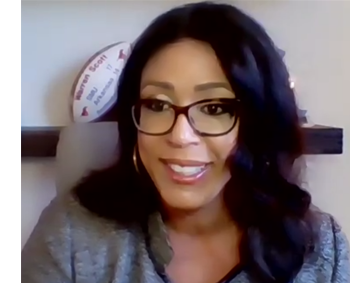
By Langston O. Frazier
With the world of sports ever more present in our day-to-day lives politically – from the Black Lives Matter movement to advocating for voting rights – “Is this what we would call a ‘revolt’”?
That’s the question Dr. Terry Anne Scott, based her virtual guest lecture: “Revolt of the Black Athlete: Then and Now,” a presentation this week that was a part of UMES’ year-long social justice symposium series.
Scott, an associate professor of American history and Director of African American studies at Hood College in Frederick, Md., focused on:
- How the intersection of race and sports has existed as a microcosm of macro social and political issues, challenges, triumphs.
- Why and how were – are – Black athletes criticized for their political consciousness (and) social activism?
- How does the concept of “staying in one’s place” factor into a discussion related to athletes and activism?
- Why were – are – their actions considered a revolt?
- Why is their voice powerful and necessary?
For example, under the heading ‘Identity and Consciousness’ Scott explained about how the famous American sociologist W. E. B. DuBois lived most of his life burdened by a “triple consciousness” by being Black, American and an athlete.
Dr. Scott aimed to tell her UMES audience the importance of protest back then related to athletes and how it affects today’s social movement. History, she said, is repeating itself but just in a new form.
When it comes to the ‘concept of place,’ three-time basketball Hall of Famer Lenny Wilkens had the most challenging time because he was a national figure on the basketball court in the mid-1960s. Wilkens felt he couldn’t even be accepted in his everyday life by society as a Black man. This caused a revolt because Black athletes could play in professional sports leagues but were not taken seriously in his era for their views on politics and social injustices – much the same today.
During the question-and-answer session, a student asked: What steps must athletes continue to take in order to see effective change regardless of level?”
“It’s all about engagement and mentorship,” Scott said. “It’s all of our responsibilities to take care of our fellow man.”
What I took away from the seminar is that education is critical, and the power of sports is more than just a game. Dr. Scott noted that HBCU students could continue to make a positive change on campus and in the greater community because history shows that students at HBCUs led the charge you have done for many years. We have to look back at our leaders from sports, politics, and other fields to find inspiration.
Scott holds a Ph.D. in history from the University of Chicago.
Langston O. Frazier is a May 2021 degree candidate in PGA golf management who plans to pursue a master’s degree in broadcast journalism at the University of Maryland this fall.

